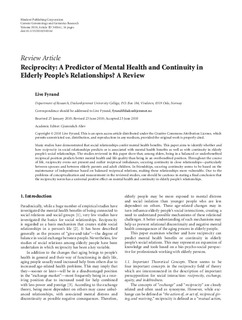| dc.contributor.author | Fyrand, Live | |
| dc.date.accessioned | 2010-10-12T12:31:34Z | |
| dc.date.available | 2010-10-12T12:31:34Z | |
| dc.date.issued | 2010 | |
| dc.identifier.issn | 1687-7071 | |
| dc.identifier.uri | http://hdl.handle.net/11250/98879 | |
| dc.description.abstract | Many studies have demonstrated that social relationships confer mental health benefits. This paper aims to identify whether and how reciprocity in social relationships predicts or is associated with mental health benefits as well as with continuity in elderly people’s social relationships. The studies reviewed in this paper show that, among elders, being in a balanced or underbenefited reciprocal position predicts better mental health and life quality than being in an overbenefited position. Throughout the course of life, reciprocity evens out present and earlier reciprocal imbalances, securing continuity in close relationships—particularly between spouses and between elderly parents and adult children. In friendships, securing continuity seems to be based on the maintenance of independence based on balanced reciprocal relations, making these relationships more vulnerable. Due to the problems of conceptualization and measurement in the reviewed studies, one should be cautious in stating a final conclusion that the reciprocity norm has a universal positive effect on mental health and continuity in elderly people’s relationships. | en_US |
| dc.language.iso | eng | en_US |
| dc.publisher | Hindawi Publishing Corporation | en_US |
| dc.relation.ispartofseries | Current Gerontology and Geriatrics Research;doi:10.1155/2010/340161 | |
| dc.subject | eldre | en_US |
| dc.subject | relasjoner | en_US |
| dc.subject | mental helse | en_US |
| dc.subject | gjensidighet | en_US |
| dc.title | Reciprocity: A Predictor of Mental Health and Continuity in Elderly People’s Relationships? A Review | en_US |
| dc.type | Peer reviewed | en_US |
| dc.type | Journal article | |
| dc.source.pagenumber | 1-14 | en_US |
